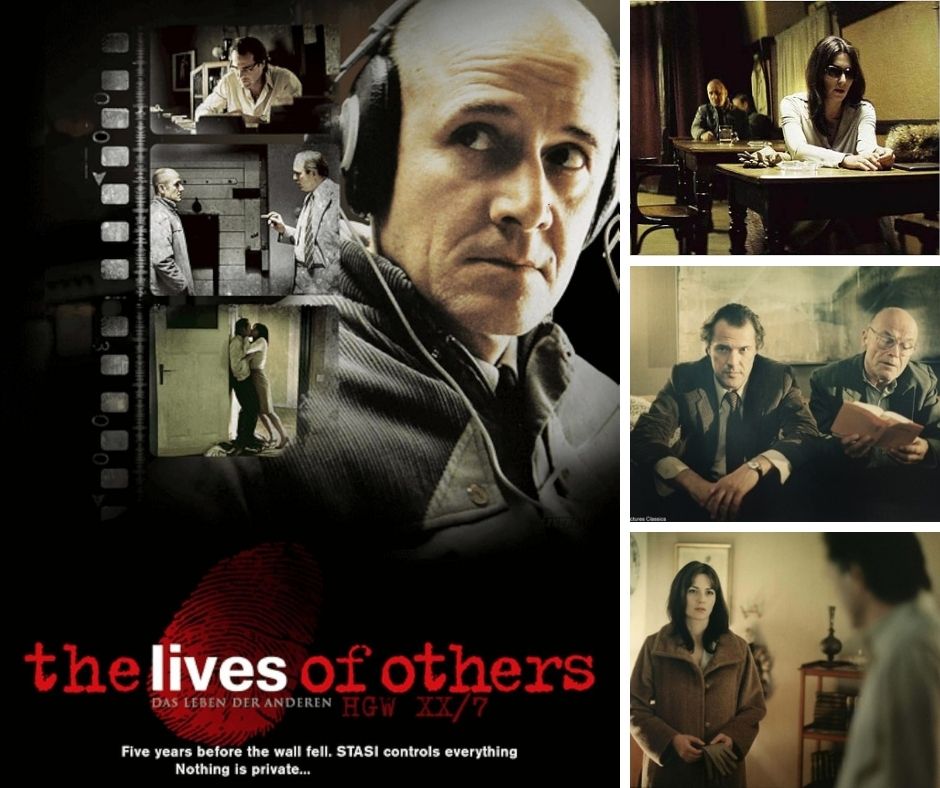The Lives of Others (2006)

In 1984 East Germany (GDR), Stasi Hauptmann Gerd Wiesler, code name HGW XX/7, is ordered by his friend and superior, Lt. Col. Anton Grubitz, to spy on playwright Georg Dreyman, whose pro-communist politics and international recognition have so far kept the state from directly monitoring him. Dreyman’s appearance as a model East German mystifies Wiesler; the playwright has no known vices or record of disloyalty or dissent at all. At the request of Minister of Culture Bruno Hempf, Wiesler and his team bug Dreyman’s apartment, set up surveillance equipment, and report Dreyman’s activities. Wiesler is disappointed to discover that Hempf is having Dreyman observed not for suspicions of disloyalty or dissent, but for his own lustful interest in Dreyman’s girlfriend, actress Christa-Maria Sieland. After an intervention by Wiesler leads to Dreyman’s discovering Hempf’s coercive relationship with Sieland, he implores her not to meet Hempf again and to be true to herself. She returns to Dreyman’s apartment without seeing Hempf.
Dreyman’s friend Albert Jerska, a blacklisted theatrical director, gives him sheet music for Sonate vom Guten Menschen (Sonata about Good People). Shortly afterwards, Jerska hangs himself. Dreyman realises that the GDR has not published its own suicide rates since 1977, and decides to publish an article in Western media. To determine whether or not his flat is bugged, Dreyman and his friends feign a defection attempt. A sympathetic Wiesler does not report it and the conspirators believe they are safe. Since all East German typewriters are registered and identifiable, an editor of prominent West German newsweekly Der Spiegel smuggles Dreyman a Groma Büromaschinen Kolibri, an ultra-flat typewriter, which he hides under a floorboard. It has only a red ribbon, which stains his fingers.
Dreyman publishes an anonymous article in Der Spiegel accusing the state of concealing the country’s elevated suicide rates. The article angers the East German authorities but the Stasi cannot link it to a registered typewriter. Rejected by Sieland, Hempf orders Grubitz to arrest her. She is blackmailed into revealing Dreyman’s authorship of the article, although the Stasi do not find the typewriter. Grubitz, suspicious of Wiesler, has him do the follow-up interrogation of Sieland. Wiesler makes Sieland reveal the typewriter’s location.
When the Stasi return to Dreyman’s apartment, Sieland realises that Dreyman will know she betrayed him and runs into the street right in front of a passing truck. Dreyman runs after her and Sieland dies in his arms. Grubitz finds nothing beneath the floorboard; he ends the investigation with a perfunctory apology to Dreyman. Grubitz then informs Wiesler that while the investigation is over, so is Wiesler’s career; his remaining years with the Stasi will be steam-opening letters for inspection in Department M, a dead-end assignment for disgraced agents. The same day, Mikhail Gorbachev is elected leader of the Soviet Union.
Two years after the fall of the wall, Hempf and Dreyman meet at a performance of Dreyman’s play, each reflecting on life before and after German reunification. Dreyman asks why he was never monitored by the Stasi, to which Hempf replies that he had been: “We knew everything.” Dreyman finds the abandoned listening devices in his apartment and rips them from the walls.
Dreyman reviews his Stasi files at the Stasi Records Agency, reading that Sieland was released just before the second search and could not have removed the typewriter. He is confused by other contradictions until, seeing a red fingerprint in the final report, he realises that the officer in charge of his surveillance – Stasi officer HGW XX/7 – had removed the typewriter from his apartment and concealed his activities, including his authorship of the suicide article. He tracks down Wiesler, who now works as a mailman, but ultimately decides not to approach him.
Two years later, Wiesler passes a bookstore window display promoting Dreyman’s new novel, Sonate vom Guten Menschen (“Sonata about a Good Person”). He opens a copy of the book, discovering that it is dedicated “To HGW XX/7, in gratitude”. As he buys a copy, Wiesler is asked if he would like it giftwrapped. He replies: “No, it’s for me.”